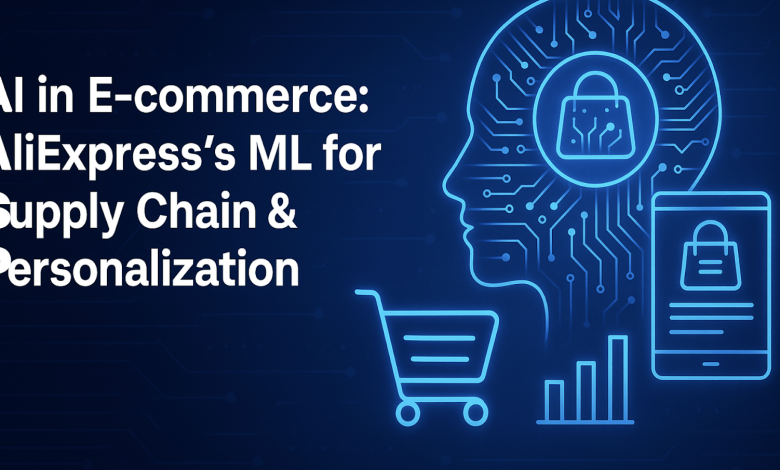
The digital marketplace has evolved far beyond simple transaction platforms. Today, global e-commerce giants operate as massive, complex logistical and data networks. No platform better illustrates the scale and intricacy of this transformation than AliExpress. As one of the world’s largest cross-border marketplaces, AliExpress deals with billions of product listings, millions of suppliers, and endless logistics challenges every day. The invisible engine that drives this colossal operation, ensuring both efficiency and profitability, is Machine Learning (ML).
AliExpress at Scale: A Foundation of Trust and AI Safety
AliExpress, part of the Alibaba Group, operates as a massive B2C nexus, connecting manufacturers and small-to-medium enterprises (SMEs) directly with consumers across 200+ countries. This decentralized, high-volume model offers competitive pricing but introduces inherent complexity in ensuring quality and buyer confidence.
To build trust in this environment, AliExpress leverages foundational safety features like its Buyer Protection Program and an Escrow Payment System that holds funds until the buyer confirms receipt. Critically, the ability to enforce these policies at a global scale—dealing with massive transaction volumes and diverse sellers—is entirely dependent on Artificial Intelligence. ML models continuously monitor seller behavior and transactions for anomalies and fraudulent patterns, flag listings for intellectual property infringement using automated vision systems, and manage the dispute resolution process, effectively acting as the digital guardian of the marketplace.
AI for Supply Chain Optimization: The Logistics Core
The core challenge for a cross-border platform is predictable and affordable delivery. AliExpress addresses this by embedding AI directly into its logistics spine, primarily through the use of Alibaba’s Cainiao Smart Logistics Network.
The Predictive Logistics Problem
Traditional logistics reacts to demand; AI-driven logistics anticipates it. Machine Learning models ingest vast datasets—including real-time consumer purchasing behavior, seasonal trends, customs processing speeds, and even local weather forecasts—to predict where demand is likely to surge. This predictive insight allows AliExpress and its partners to pre-position inventory closer to high-demand regions, fundamentally cutting down on last-mile delivery times and costs.
ML in Warehouse and Dynamic Routing
For a given order, AI instantly calculates the optimal fulfilment path. This involves more than just finding the shortest route; ML models perform dynamic routing that factors in:
- Inventory Allocation: Which warehouse or supplier can fulfil the order fastest and cheapest.
- Consolidation: Identifying opportunities to group multiple small packages into consolidated shipments to optimize freight costs.
- Carrier Selection: Automatically selecting the most reliable carrier based on historical performance data for the specific delivery corridor.
This move to AI-driven predictive freight forwarding ensures that shipping is both faster and more cost-effective, turning a massive logistical challenge into a competitive advantage.
The Power of Personalization: Machine Learning at Scale
For the consumer, the true intelligence of AliExpress is evident in its ability to manage choice. With billions of products, simple searching is insufficient; powerful personalization is essential to prevent user paralysis.
Recommendation Engines and Collaborative Filtering
At the front end, AliExpress runs highly sophisticated Recommendation Engines fueled by deep learning. These models don’t just recommend products you’ve bought before; they use collaborative filtering to analyze the purchasing patterns of millions of other users who share similar browsing habits. This enables the platform to surface relevant products that the user didn’t even know existed, greatly increasing product discovery and transaction value.
Search and Ranking AI
When a user types a query, AI instantly ranks the results based on hundreds of weighted variables, including:
- Seller trustworthiness and service ratings.
- Product quality scores (derived from reviews and return rates).
- User-specific purchase history and preferences.
- The current conversion rate of the product listing.
This dynamic ranking ensures the most relevant, reliable, and popular item appears first, optimizing the customer experience and maximizing conversion rates, even for the most ambiguous queries.
Vision AI for Trust and Quality Assurance
Beyond logistics and personalization, AI serves a crucial gatekeeping function. Computer Vision (Vision AI) is deployed to monitor product quality and integrity across the marketplace.
Combating Counterfeits
One of the largest challenges for any global marketplace is preventing the sale of fake or counterfeit goods. AliExpress uses advanced Vision AI models that constantly scan uploaded product images. By comparing these images against a vast database of known branded goods, trademarks, and high-quality product images, the AI can automatically detect visual similarities that suggest IP infringement or counterfeiting, flagging or taking down the listing before a buyer ever sees it.
Product Categorization
Vision AI also handles mass-scale product organization. When a seller uploads an image, the AI instantly recognizes the object (e.g., “a black leather backpack with brass buckles”), ensuring the product is accurately categorized. This categorization is vital for accurate search results and for applying platform-wide rules and regulations specific to product type.
Conclusion: The Future of AI in Retail Marketplaces
AliExpress’s success is a blueprint for how AI transcends basic automation to become the core infrastructure of a global business. Machine Learning powers its logistics backbone, ensures buyer safety via fraud detection, and transforms chaotic inventory into a highly personalized shopping experience. Moving forward, the platform will continue to push the boundaries of AI, likely integrating more advanced Agentic AI to automate complex tasks, from multilingual customer service to optimizing seller negotiation and compliance. For any organization looking to scale complex, cross-border operations, the AliExpress model proves that AI is no longer a feature—it is the indispensable foundation.





